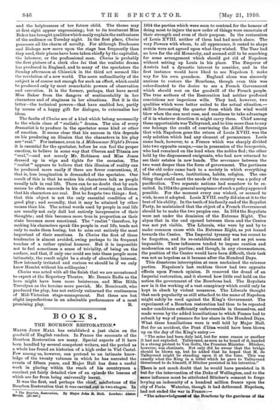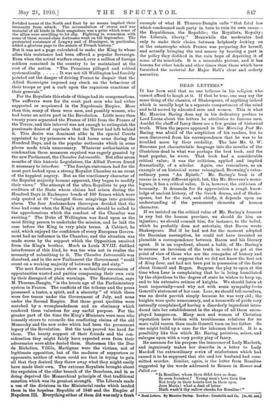BOOKS.
THE BOURBON RESTORATION.•
MAJOR JOHN HALL has established a just claim on the goodwill of English readers. In France the accounts of the Bourbon Restoration are many. Special aspects of it have been handled by several competent writers, and the period as a whole has found an historian of a high order in Viel Castel. Few among us, however, can pretend to an intimate know- ledge of the twenty volumes in which he has narrated the events of fifteen years, and Major Hall has done a useful work in placing within the reach of his countrymen a succinct yet fairly detailed view of an episode the lessons of which are far from being universally learnt.
It was the firsts and perhaps the chief, misfortune of the Bourbon Restoration that it was carried out in two stages. In • The Bourbon Restoration. By Major John M. Sall. tondoni Alston givers, [Cl net.]
1814 the parties which were soon to contend for the honour of doing most to injure the new order of things were uncertain of their strength and even of their purpose. In the restoration of Louis XVIII. neither of them had had much share. The very Powers with whom, to all appearance, it rested to shape events were not agreed upon what they wished. The Tsar had no love for the old Monarchy, and seemed still to be searching for some arrangement which should get rid of Napoleon without setting up Louis in his place. The Emperor of Austria had a dynastic interest to consider, and in the first instance would have liked to see Napoleon I. make way for his own grandson. England alone was sincerely anxious to restore the Bourbons, though even this was subordinated to the desire to see a French Government which should rest on the goodwill of the French people. The true authors of the Restoration had neither profound convictions nor imperious wills. They had, however, two qualities which were better suited to the actual situation,— skill in forecasting the quarter from which the wind would blow when the sun next rose, and readiness to take advantage of it in whatever direction it might carry them. Chief among these opportunists was Talleyrand, and to him more than to any one belongs the credit of convincing the Allied Sovereigns that with Napoleon gone the return of Louis XVIII. was the only solution which had any element of permanence. Louis came back, however, to a France which was sharply divided into two opposite camps,—one in possession of the bourgeoisie, who had remained on the Land when the nobles fled; the other held by the dispossessed emigrants, who had now returned to see their estates in new hands. The severance between the two went deeper than the form of government. The partisans of the old order came back to a society in which everything had changed,—laws, institutions, habits, religion. The one thing that could meet the needs of the country was a policy of pacification. Two separate nations had somehow to be re- united. In 1814 the general acceptance of such a policy appeared possible. For the moment every one wished, or seemed to wish, to see it adopted. Louis XVIII. really did aim at it to the hest of his ability. In the teeth of his family and of the Royalist Party, he maintained that the object of a French Government should be to make the two peoples one. In 1814 the Royalists were not under the dominion of the Extreme Right. The abyss that in the end opened between them and the Centre was not yet visible. The Liberals, who were by and by to make common cause with the Extreme Right, as yet leaned towards the Centre. The Imperial tyranny was too recent to be forgotten, and its re-establishment did not as yet seem impossible. These influences tended to impose caution and moderation on all parties ; and though, in any circumstances, the position of the Centre would have been difficult, their task was not as hopeless as it became after the Hundred Days. This disastrous interruption at once unchained the extreme parties. Napoleon's last reckless throw had two opposite effects upon French opinion. It removed the dread of an Imperial restoration, and it showed how little real hold on the nation the government of the Bourbons had. The Royalists saw in it the working of a vast conspiracy which could only be kept in check by violent measures. The Liberals thought that such popularity as still attached to the name of Napoleon might safely be used against the King's Government. The experiment of a Bourbon restoration had thus to be repeated under conditions sufficiently unfavourable in themselves, and made worse by the added humiliations to which France had to submit by way of penance for her share in the Hundred Days. What these humiliations were is well told by Major Hall. But for an accident, the Pont d'Iena would have been blown up on the day of the King's entry :—
" The mine had been duly laid, but for some reason or another it had not exploded. Talleyrand, as soon as he heard of it, handed in a strong protest to Von Goltz, the Prussian Minister. Blucher, however, was obstinate. Not only did he swear that the bridge should be blown up, but he added that he hoped that M. de Talleyrand might be standing upon it at the time. This was exactly what the King in a letter which he gave to Talleyrand threatened to do himself, if Bliicher persisted in his intention."
There is not much doubt that he would have persisted in it but for the intervention of the Duke of Wellington, and to the same influence must be attributed Blucher's consent to forgo levying an indemnity of a hundred million francs upon the
city of Paris. Waterloo, though it had dethroned Napoleon, had not ended the war in France :—
"The acknowledgnse4 ad the Bourbons by the garrisons of the
fortified towns of the North and East by no means implied their immunity from attack. The accumulation of stores and war material of all kinds in their magazines was a prize which some of the allies were unwilling to let slip. Fighting in connexion with some of these second-class fortresses went on till September. The protracted resistance of Longwy and of -Huningue, in particular, added a glorious page to the annals of French history."
But it was not a page calculated to make the King to whose allies this resistance had been offered a popular Sovereign. Even when the actual warfare ceased, over a million of foreign soldiers remained in the country to be maintained at the cost of the nation. " The Prussians pillaged and robbed systematically It was not till Wellington had forcibly pointed out the danger of driving France to despair that the Allied Sovereigns imposed any check on the behaviour of
their troops or put a curb upon the rapacious exactions of their generals."
For the Royalists this state of things had its compensations. The sufferers were for the most part men who had either supported or acquiesced in the Napoleonic Empire. More than this, many of them were men, and possibly women, who had borne an active part in the Revolution. Little more than twenty years separated the France of 1815 from the France of the Terror, and this interval was not enough to extinguish the passionate desire of reprisals that the Terror had left behind it. This desire was dominant alike in the special Courts appointed to try prisoners who had borne arms during the Hundred Days, and in the popular outbreaks which in some places made trials unnecessary. Whatever authorisation or
condonation these measures required was eagerly granted by the new Parliament, the Chambre Introuvable. But after seven months of this historic Legislature, the Allied Powers found
it necessary to interfere. " The foreign statesmen had for the most part looked upon a strong Royalist Chamber as an event of the happiest augury. But as the reactionary character of the Royalist majority became apparent, they began to modify their views." The attempt of the ultra-Royalists to pay the creditors of the State whose claims had arisen during the Hundred Days in Exchequer bonds of 100 francs which were only quoted at 60 "changed these misgivings into genuine alarm. The four Ambassadors thereupon decided that the
time had come when the King's attention should be called to the apprehensions which the conduct of the Chamber was exciting." The Duke of Wellington was fixed upon as the most fitting person to undertake the mission, and be laid the case before the King in very plain terms. A Cabinet, he said, which enjoyed the confidence of every European Govern- ment had no influence in the Chamber, and the situation was made worse by the support which the Opposition received
from the King's brother. Much as Louis XVIII. disliked interference of this kind, he was too wise not to realise the
necessity of submitting to it. The Chanthre Introuvable was
dissolved, and in the new Parliament the Government "could count on a working majority of between fifty and sixty."
The next fourteen years show a melancholy succession of opportunities wasted and parties compassing their own ruin by their disregard of plain warnings. The Restoration, says M. Thureau-Dangin, " is the heroic age of the Parliamentary system in France. The conflicts of the tribune and the press possessed a lustre, a spirit, and a sincerity" of which there were few traces under the Government of July, and none under the Second Empire. But these great qualities were matched by a wrongheadedness and an obstinacy which rendered them valueless for any useful purpose. For the greater part of the time the King's Ministers were men who honestly strove to reconcile the conflicting claims of the old Monarchy and the new order which had been the permanent legacy of the Revolution. But the task proved too hard for them. The hearty support of their friends and the con- sideration they might fairly have expected even from their adversaries were alike denied them. Statesmen like the Duo de Richelieu, Villele, Martignao were the victims, not of legitimate opposition, but of the madness of supporters or
opponents, neither of whom could see that in trying to gain all that they desired they threw away what they might easily have made their own. The extreme Royalists brought about the expulsion of the elder branch of the Bourbons, and in so doing deprived the Monarchical principle of that traditional sanction which was its greatest strength. The Liberals made a use of the divisions in the Ministerial ranks which landed them in the hopeless Republic of 1848 and the Empire of Napoleon In. Everything either of them did was only a fresh example of what M. Thurean-Dangin calls " that fatal law which condemned each party in turn to ruin its own cause— the Republicans, the Republic; the Royalists, Royalty; the Liberals, liberty." Meanwhile the moderates had only to make their choice between helplessly looking on at the catastrophe which France was preparing for herself, and actually bringing the end nearer by bearing a part in the policy they disliked in the vain hope of depriving it of some of its mischiefs. It is a miserable picture, and it has lessons for other lands and other times than those which have furnished the material for Major Hall's clear and orderly narrative.







































 Previous page
Previous page